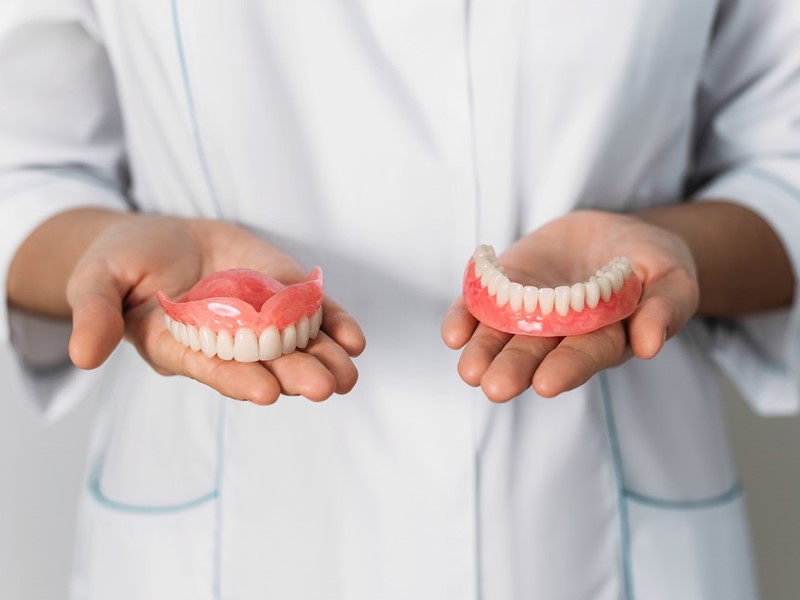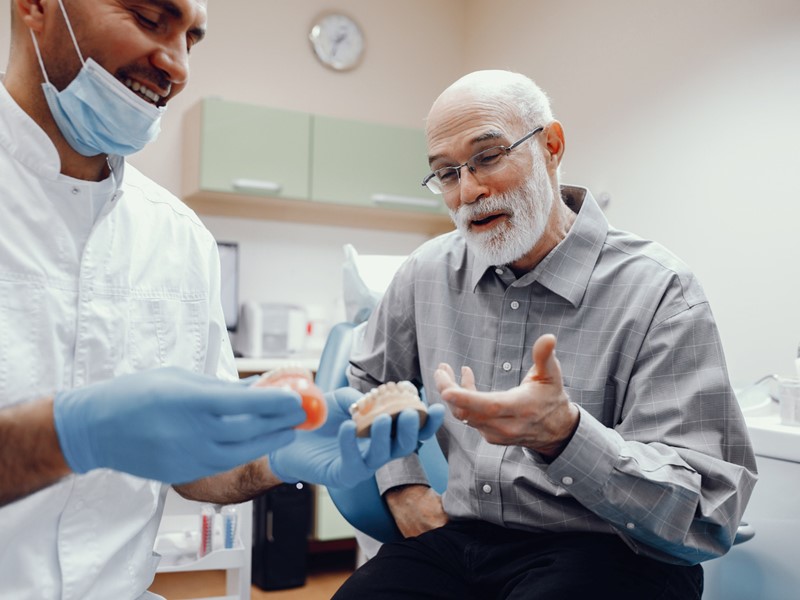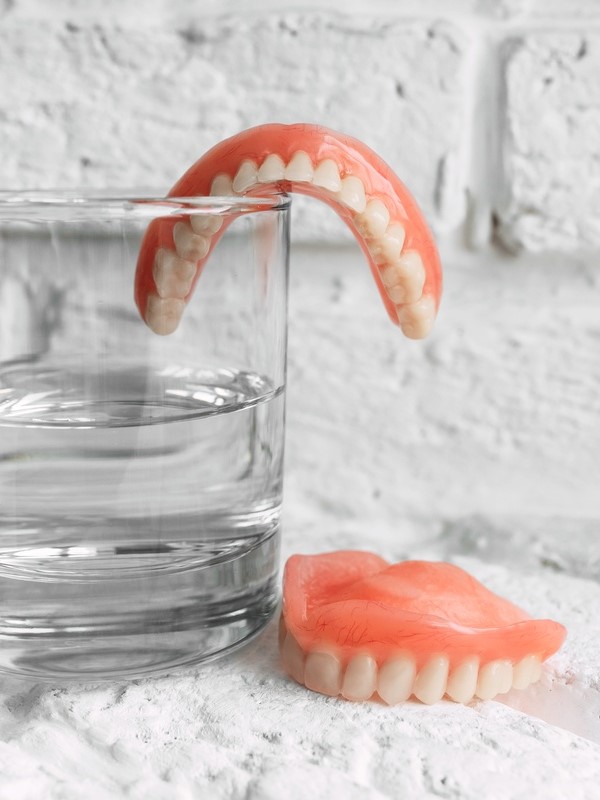With proper care, removable dentures can last 5-10 years. Regular check-ups help extend their lifespan. Implant-supported dentures are designed to last for life.
Dentures offer a practical solution for missing teeth, helping you regain both functionality and confidence in your smile. Whether you need a full or partial set, dentures can restore the natural look and feel of your teeth.
At Family Dental Health Center in Idaho Falls, our experienced family dentists work with each patient to find the right denture solution for their needs.

What Are Dentures?
Dentures are dental appliances that replace missing teeth and surrounding tissue. Made from durable materials like acrylic and metal, dentures are designed to look and function like natural teeth. They sit snugly in the mouth, filling in gaps left by missing teeth and helping restore essential functions like chewing and speaking.
There are two main types of dentures: full and partial. Full dentures replace all teeth in the upper or lower jaw, while partial dentures fill in spaces when some natural teeth remain. Dentures are a reliable solution for missing teeth and help maintain the structure of your jaw and facial muscles.

Who Are Dentures For?
Dentists recommend dentures to individuals who have lost multiple teeth. Many people think dentures are only for older adults, but that’s not always the case. In fact, tooth loss can occur at any age for various reasons, including injury, decay, or gum disease.
They can restore function to those who have lost the ability to speak or eat and provide patients with a natural-looking smile. Some dentures also help prevent future tooth loss by strengthening your jaw bone.
Many people choose dentures because they are a great alternative to more invasive tooth replacement solutions like implants.
Types of Dentures
Family Dental Health offers several types of dentures designed for different needs. Your dentist can help you determine which solution is best for you.
Full dentures
Full dentures replace all teeth in the upper or lower jaw. They rest on the gums, providing a complete solution for people needing an entire arch replaced. They are removable and should be taken out every night before bed.
Partial dentures
Partial dentures fill in gaps where some natural teeth remain. These removable dentures are attached to surrounding teeth by clasps, making them stable and secure. However, you still need to remove them nightly for cleaning and maintenance.
Implant-supported dentures
Implant-supported dentures attach to dental implants in the jawbone. They are designed to be a permanent solution to tooth replacement, helping you regain the functionality and appearance of your natural smile.
Our Process
Our process for creating dentures is thorough and tailored to each patient’s needs. It begins with a consultation, where we assess your oral health and discuss your goals. This step helps us determine the best type of dentures for you, whether full, partial, or implant-supported.
Impressions and fittings
Once you decide on the right option, we take precise impressions of your gums and any remaining teeth to ensure a comfortable, secure fit. These impressions are used to craft dentures that align with your mouth’s unique shape. Afterward, you’ll come in for fittings, where we adjust the dentures for maximum comfort and function.
Getting used to dentures
It’s normal for dentures to feel different at first, but most patients adapt comfortably with time. We’re here to guide you through the adjustment period, making any necessary modifications to ensure a smooth transition. Most people adapt very quickly to implant dentures; it may take you a bit longer to feel completely comfortable with full or partial dentures.


How to Care for Your Dentures
It’s essential to care for your dentures properly if you hope to keep them clean, comfortable, and long-lasting. Regardless of which type of dentures you have, it is important to see your family dentist regularly for adjustments and maintenance.
Full dentures
- Cleaning tips: Brush your dentures daily with a soft brush and a mild, non-abrasive cleanser. Rinse well and soak overnight in a denture solution to maintain moisture.
- Avoid: Avoid hot water, which can warp dentures. Steer clear of toothpaste, as well, which is too abrasive.
Partial dentures
- Cleaning tips: Brush your dentures with a soft denture brush and remove food particles around the clasps. Soak them overnight to keep them clean and moist.
- Avoid: Refrain from bending or twisting the clasps, which can weaken or damage them.
Implant-supported dentures
- Cleaning tips: Use a soft brush to clean around your implants and your dentures. Scrub implants with a gentle brush to remove plaque and food particles.
- Avoid: Although you may be tempted, do not skip daily cleaning around your implants, as buildup can lead to gum issues. Avoid abrasive cleaners on your dentures.
Frequently Asked Questions About Dentures
Can I eat normally with dentures?
Yes, though it may take time to adjust. Start with softer foods and gradually add variety.
Will dentures affect my speech?
Some adjustments are expected with full and partial dentures, but most people adapt quickly with practice. Implant-supported dentures are less likely to affect your speech.
How long does the process take to get dentures?
Depending on the type of dentures you require, it usually takes a few weeks from the initial consultation with your family dentist to the final fitting.
Contact Family Dental Health Center
If you’re considering dentures, Family Dental Health Center, located in Idaho Falls, is here to help. Our experienced team can guide you through your options and answer any questions you may have. Schedule a consultation now and take the next step toward a comfortable, complete smile.
